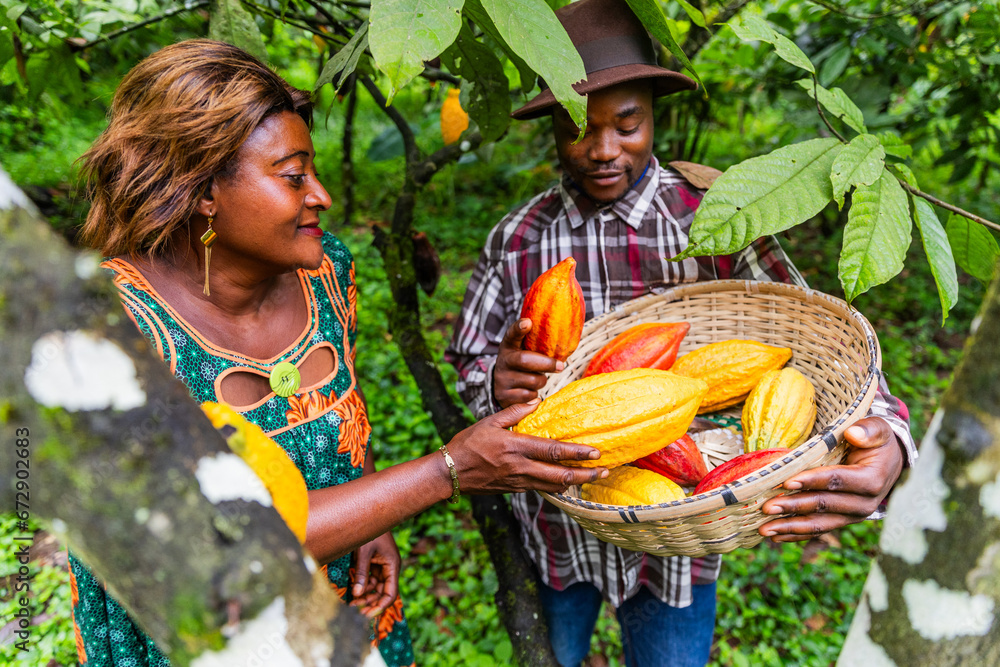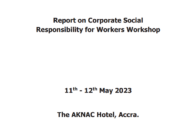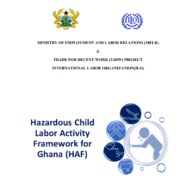Ghana
The overall objective of the Trade for Decent Work project is to improve labour relations and working conditions in accordance with sustainable development objectives. The project seeks to contribute to the United Nations Sustainable Development Goal (SDG) 8 concerning Decent Work and Economic Growth, specifically SDG 8.8.2 on national compliance with labour rights based on International Labour Standards, and SDG 8.7 which relates to the eradication of forced labour and the elimination of the worst forms of child labour by 2025.
Ghana has been a member of the ILO since 1957 and has ratified 8 Fundamental Conventions, 2 governance conventions and 41 technical conventions.
The project in Ghana aims to improve the implementation in law and practice of International Labour Conventions, particularly the Fundamental Conventions, and to promote the ILO Tripartite Declaration of Principles on Multinational Enterprises and Social Policy (MNE Declaration). The project also focuses on supporting the government of Ghana in its efforts to eliminate child labour in all its forms, with an emphasis on child labour in the cocoa sector.
Through concerted efforts and with the support of project initiatives, the government has prioritized strengthening the legislative and institutional framework to translate and implement the safeguards and rights guaranteed in ratified conventions at the national level. By establishing robust monitoring mechanisms and by bolstering institutions, the government underscores the significance it places on enforcing these rights while concurrently fostering transparency, effectively managing social conflicts, and enhancing access to justice for all citizens. This involves working with various stakeholders to bolster national institutional capacity to fulfil reporting obligations.

Objectives
The project supports the government of Ghana, its institutions, and social partners to strengthen the implementation of the International Labour Standards ratified by Ghana.
Achievements
The following achievements highlight the project’s commitment to enhancing labour standards, promoting child welfare, and fostering collaboration among stakeholders in Ghana’s labour landscape:
- Timely submission of all regular reports to the ILO supervisory bodies, with no reports outstanding.
- Successfully securing approval for the inclusion of provisions targetting the elimination of child labour in the draft Labour Code.
- Developing and implementing a Hazardous Activity Framework and List as well as a draft legislation on the subject to comprehensively address child labour in all its forms
- Consolidating the Hazardous Activity Framework and the cocoa sector-specific framework into a unified document covering 32 economic sectors, ensuring a cohesive approach to addressing hazardous work.
- Capacitation of judicial officers on key labour-related issues such as trafficking in persons, child labour, and forced labour conventions, thereby enhancing expertise in prosecuting such labour-related offenses.
- Capacitation of judicial officers and labour inspectors to apply International Labour Standards and Fundamental Principles at Work.
- Developing guidelines and templates for labour inspectors and the Labour Department on the inspection of child labour in the informal sector.
- Empowering legal professionals to uphold labour rights through a scholarship program.
- Advocating for and securing the integration of capacity-building activities into existing governmental structures, such as the Ministry of Employment and Labour, to ensure sustained efforts in promoting labour rights and compliance.
- Successful establishment of national focal points to promote and apply the MNE Declaration, facilitating collaboration among stakeholders and promoting responsible business practices for the realization of decent work.
- Promotion of workers’ rights in operations and supply chains through the establishment of a Corporate Social Responsibility (CSR) Platform by the Trade Union Congress of Ghana for the promotion of the MNE Declaration with project support.
Activities
The project prioritises the following:
- Strengthening the capacity of the constituents to actively participate in national processes to comply with international labour standards (ILS), particularly the Fundamental Conventions, and reporting obligations.
- Supporting tripartite constituents and other stakeholders to advocate for the promotion and implementation of the child labour conventions in the cocoa sector.
- Supporting tripartite constituents to enable them to make better use of the MNE Declaration to strengthen the nexus between decent work and trade through engagement and dialogue with multinational enterprises.
- Strengthening the national dialogue mechanism to facilitate and advance a just transition towards an ecologically responsible economy.
Resources

Informative / Ghana
Corporate Social Responsibility for Workers Workshop Report
May 12, 2023

Informative / Ghana
ILO Report on the MNE Forum for Key Stakeholders In the Agricultural Value Chain
May 11, 2023

Informative / Ghana
Report on Multinational Enterprises Dialogue on the MNE Declaration 2024
May 10, 2023

Informative / Ghana
Harmonized HAF Working Document 2022
June 30, 2022
Fundamental Conventions and select International Labour Standards and protocols ratified
Promoting the ratification of International Labour Standards
Supporting the Government in its efforts to initiate the ratification process for the Violence and Harassment at Work Convention, 2019 (No.190)
The country has expressed an interest in ratifying Convention No.190. A socioeconomic study on violence and harassment was undertaken by the Government in 2022 and a gap analysis on Convention No.190 is currently being undertaken by the project to facilitate the ratification.
Action
- Organization of workshops and training
Results
- Completion of a socio-economic study and a gap analysis on Convention No.190 to facilitate ratification
Supporting the Government to work towards the ratification of the Domestic Workers Convention, 2011 (No. 189)
Following the adoption of the Domestic Workers Regulations at the end of 2020, a 2020 gap analysis concerning Convention No. 189 is currently being updated with a draft prepared in January 2024.
Action
- Organization of workshops and training
Results
- Successful development of a gap analysis on Convention No. 189 to facilitate ratification
Supporting the Government to address the comments of the ILO supervisory bodies
Capacity has been developed within the National Tripartite Committee to address several normative issues. This progress was recognized by the ILO supervisory bodies, specifically the Committee of Experts on the Application of Conventions and Recommendations (CEACR). In addition, the ratification of the following instruments is being considered in line with the recommendations of the supervisory bodies: the Labour Inspection (Agriculture) Convention, 1969 (No.129), the Employment Policy Convention, 1964 (No.122), the Maternity Protection Convention, 2000 (No.183), and the Protocol of 2014 to the Forced Labour Convention, 1930.
Action
- Support was provided to the Government to address the comments of the ILO supervisory bodies, particularly the CEACR
Results
- Tangible progress made in the application of certain ratified Conventions, which was acknowledged by the ILO supervisory bodies in February 2023
Applying ratified international labour instruments at the national level
Building the capacity of relevant entities on the application in practice of the Worst Forms of Child Labour Convention, 1999 (No. 182)
The project worked to capacitate members of the judiciary, labour inspectorate, the Ministry of Labour and other critical stakeholders including the police child labour unit, Ministry of Women, Children and Social Welfare and Labour Commission on Convention No. 182. Consequently, the Ministry of Employment and Labour Relations expanded and consolidated a Hazardous Activity Framework (HAF) to tackle child labour in all its forms. This is the first ever composite HAF that comprises all economic sectors of the country. The Framework was validated in March 2023. It sets the limit for activities prohibited to children (hazardous) and lists light work activities permitted between the ages of 13 and 15. So far, the legislation of the HAF has been accepted by all stakeholders. Additionally, there were capacity building initiatives undertaken for district labour inspectors, social workers, and private cocoa-buying agencies in 5 cocoa-growing districts in the Eastern and Ashanti regions with regards to the implementation of the Ghana Child Labour Monitoring System in local communities
Action
- Organization of training and capacity building initiatives for various target groups, including the labour inspectorate, members of the judiciary, ministry of labour, private cocoa buying agencies, etc
Results
- Strengthened the knowledge of representatives of the ministry of labour and other critical stakeholders on the link between international labour standards and work that is prohibited for children, as well as light work that is permitted to children in line with the ILO conventions on child labour
- Equipping members of the judiciary and the labour inspectorate to apply international labour standards, including in reporting, implementation of the HAF, etc
- Enhanced the awareness of relevant stakeholders on the implementation of the Ghana Child Labour Monitoring System in local communities
Constituents effectively participate in national processes that address gaps between national law and practice and targeted conventions
Enhancing child labour protection in the cocoa sector
Supporting the implementation of Convention No. 182
A comprehensive Hazardous Activity Framework (HAF) and List to tackle child labour in all its forms was finalized and adopted with project support in 2023. The HAF is the first ever composite version that includes within its scope 32 economic sectors. The objective of the HAF is to list the types of hazardous work prohibited to children and elaborate on the conditions under which light work may be permitted for children as required by Convention No. 182.
Action
- Organizing workshops and trainings
Results
- The adoption and subsequent expansion of a HAF and List to tackle child labour in all its forms in 32 economic sectors
Enhanced collaboration and dialogues between constituents, supply chain actors and trade partners to prompt responsible business conduct in policy and practice
Raising awareness and building the capacity of ILO constituents on the ILO Tripartite Declaration of Principles concerning Multinational Enterprises and Social Policy (MNE Declaration)
Promotion of the MNE Declaration and support to the ILO constituents in the designation of focal points
Ghana designated national focal points in accordance with Annex II of the MNE Declaration. In 2022, the focal points were established in the Ministry of Employment and Labour Relations, the Ghana Investment Promotion Centre, the Ghana Employers Association (GEA), and the Trade Unions Congress of Ghana (TUC). The focal points implemented sectoral action plans for the promotion of MNE in their various sectors, including the MNE Help Desk, and a CSR Platform operated by the GEA and TUC, respectively.
Action
- Tailored sensitization workshops for government officials, employers' and workers' organizations
Results
- Enhanced awareness of the MNE Declaration and how it may be used by government officials, employers’ and workers’ organizations
- The country decided to appoint national focal points for the promotion of the MNE Declaration in accordance to Annex II of the instrument
- Support was provided to the national focal points to develop their national action plan for the promotion of the MNE Declaration
Promotion of the MNE Declaration and the application of its principles by workers’ and employers’ organizations
Supporting the implementation of the National Action Plan for the promotion and the application of the ILO Tripartite Declaration of Principles concerning Multinational Enterprises and Social Policy (MNE Declaration)
In the area of the promotion of the MNE Declaration, the Trade Union Congress of Ghana and the Ghana Federation of Labour set up a Corporate Social Responsibility (CSR) Platform comprising 21 and 6 affiliates, respectively. The platform enabled members to analyse international CSR instruments and frameworks through the lens of the international labour standards and optimize their organizational or company-level Human Rights and Due Diligence (HRDD) processes to promote and respect workers’ rights in their own operations and supply chains.
Action
- A dialogue was organized on the role of multinational enterprises in achieving decent work based on the guidance offered by the MNE Declaration
- Supported workers’ organizations to create a CSR platform
- Supported employers’ organizations to promote the ILO Helpdesk for Business
Results
- Actions agreed upon for the promotion of the MNE Declaration in the agriculture sector with a focus on eliminating child labour and its root causes
- Capacitated workers’ representatives to promote CSR
- Launch of the workers’ CSR platform
- A dedicated link to the helpdesk was included on the website of the employers’ organization
- Capacitated businesses to strengthen alignment of their business operations with international labour standards and the labour dimensions of HRDD
Tripartite constituents effectively fulfil their respective roles in reporting to the supervisory bodies
Supporting the Government in drafting country reports on child labour
Supporting the government to enhance the reporting on Fundamental Conventions on child labour
In 2022 and 2023, initiatives were taken to strengthen the capacity of magistrates and labour inspectors to implement and use international labour standards (ILS) and Fundamental Principles at Work in their practice. In addition, lawyers from the Minstry of Justice were provided training to support their drafting of annual country reports.
Action
- Organization of trainings on reporting for lawyers from the Ministry of Justice who are responsible for drafting reports on the implementation of the conventions against child labour
Results
- Built the capacity of the Government to meet its reporting obligations
- Timely fulfilment of reporting obligations to the ILO Committee on the Application of Standards
Supporting the organization of national workshops for national entities involved in the application of international labour standards to enhance reporting
In 2022, the project supported the functioning of the tripartite ILS Reporting Team of nine members that was set up by the Ministry of Employment and Labour Relations earlier in the project. This included in-depth training on ILS and step-by-step guidance on ILS reporting based on global practice. In addition, the project supported the ILS Reporting Team to develop templates for gathering routine administrative data and information that was necessary for reporting.
Action
- Organization of capacity-building initiatives for the Ministry of Interior, the Commission for Human Rights and Administrative Justice, the Ministry of Environment, National Maritime Authority, and personnel responsible for data collection for national reporting on ILS
- Organization of capacity building workshops on ILS reporting for the Government entities responsible for the drafting of the reports
Results
- Strengthened the capacity of the entities involved in the implementation of ratified conventions to provide inputs to the draft reports to the ILO supervisory bodies
- Built the capacity of the Government to meet its reporting obligations
- Timely submission of reports by Ghana with no reports outstanding in 2022 and 2023